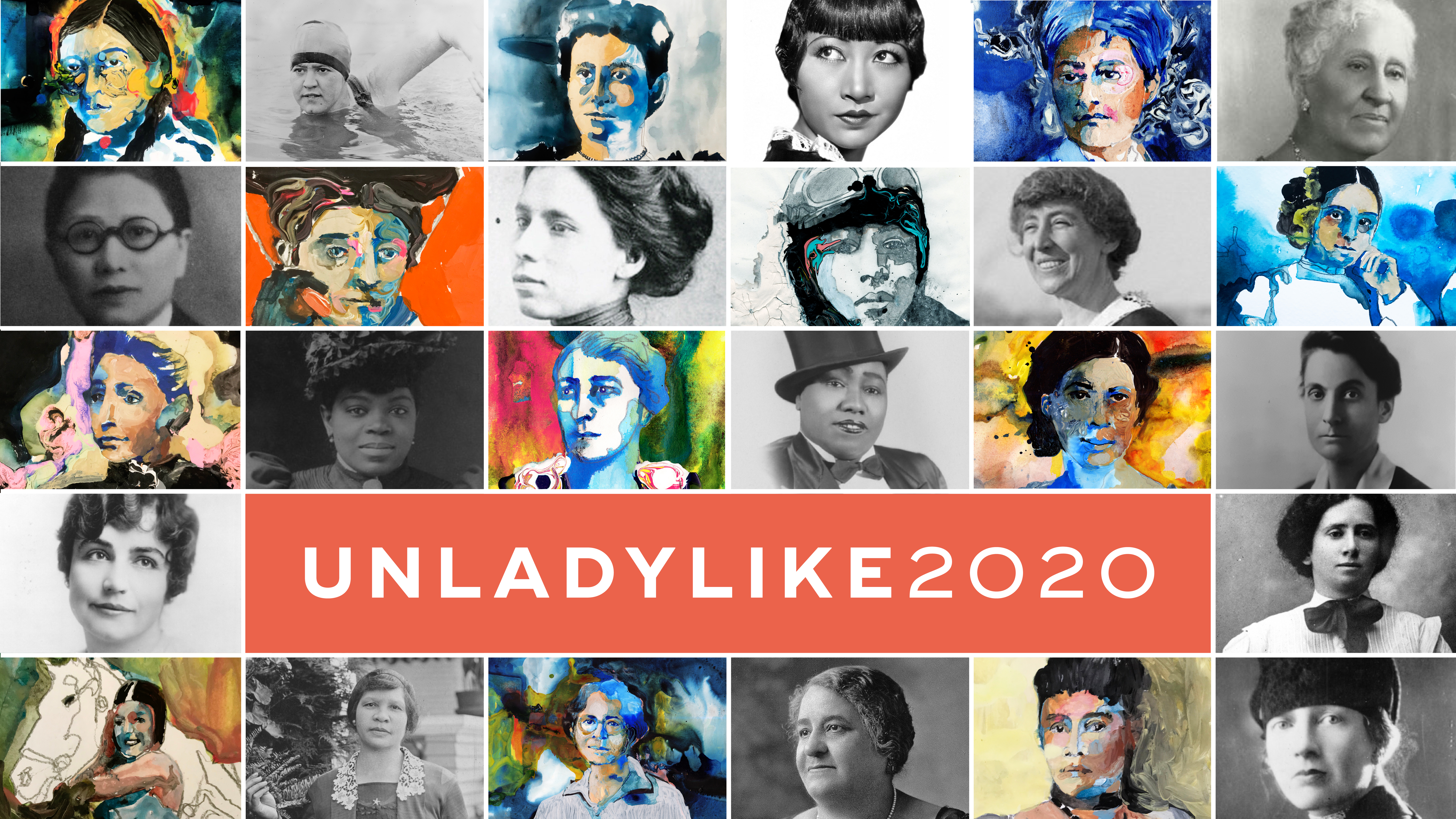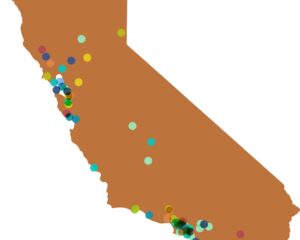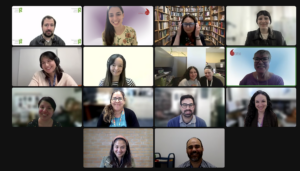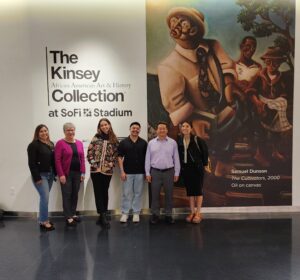“We hope UNLADYLIKE2020 will inspire, engage, and educate audiences about an underrepresented narrative — how women, and in particular women of color, changed America 100+ years ago, paving the way for future generations to do many ‘unladylike’ things.” – Charlotte Mangin
UNLADYLIKE2020 is an innovative multimedia series featuring diverse and little-known, trend-setting American heroines from the early years of feminism and the women who follow in their footsteps. The series presents the biographies of 26 bold American women from the turn of the 20th century who broke barriers in male-dominated fields such as science, medicine, politics, business, journalism, sports, aviation, and the arts.
With support from the National Endowment for the Humanities, California Humanities, and ten other state humanities councils, the series of short, animated profiles premiered digitally in 2020 in honor of the centennial of women’s suffrage on PBS’s flagship biography series American Masters, along with a one-hour television special about trailblazers in politics and civil rights. You can watch all 26 shorts at www.unladylike2020.com/watch.
In honor of Women’s History Month, we recently spoke with UNLADYLIKE2020’s co-executive producers and directors Charlotte Mangin and Sandra Rattley about the series and its impact over the past year.

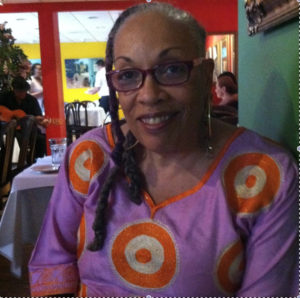
What inspired you to make the UNLADYLIKE2020 series?
Charlotte: I was inspired to create the UNLADYLIKE2020 series after discovering a nonfiction picture book titled Soar Elinor about pilot Elinor Smith on a museum visit with my two young sons. In 1927, at age 16, Smith became the youngest licensed pilot in the world, and her dramatic aerial stunts earned her the nickname “Flying Flapper.” She went on to become a celebrated test pilot who later worked with NASA on shuttle landing simulators. After reading her story, I was inspired but also deeply frustrated. Why had I never heard of Elinor Smith? Why was her story not part of mainstream history? So, I started to research her, and she led me to other aviators and women in other professional fields at the turn of the 20th century. What I uncovered was a treasure trove of life stories, each more extraordinary than the next, of rebellious, persistent, and daring — unladylike! — women from all walks of life who overcame severe sexism and racism to pave the way for future generations of empowered women. What blew me away was how many women I had never heard of! In addition, a majority of the exceptional but little-known women I came across were women of color. I can only imagine the courage and determination it took for them to accomplish what they did a century ago. When I realized that the 100th anniversary of women’s suffrage was in 2020, I knew there couldn’t be a more fitting time to elevate these stories to their rightful place in U.S. history and ensure they are never forgotten again.
UNLADYLIKE2020 premiered in March of last year during Women’s History Month. Can you give us a snapshot of the series’ successes and the audiences it’s reached over the past year?
Sandy: The 26 UNLADYLIKE2020 short documentary films distributed by American Masters, and the one-hour special “The Changemakers” broadcast by PBS on public television stations nationwide, have galvanized an audience of close to 5 million to date across all platforms. In addition, the free and standards-aligned educational materials that support the series for middle and high school instruction, and are part of the PBS LearningMedia collection, have had more than 30,000 cumulative views in the past year. As part of our engagement and impact campaign for the series, we have convened 50 screening events nationally and internationally, including panel discussions and community dialogues to screen episodes of the series and engage in conversation about different aspects of the work and its contemporary relevance.
Our objectives for the series were to: expand access and the availability of historical documentary storytelling utilizing a contemporary look and feel, and a unique visual approach that links the past to the present, and makes history exciting to a 21st century audience; to present U.S. history from a diverse, inclusive perspective – including women of color, and the narratives of women from diverse regions of the country and diverse cultural experiences; to reach new, intergenerational audiences who may not typically engage with history or biography; to change and expand the way in which U.S. history is viewed and taught in middle and high schools; to promote the investigation of local history in communities across America, and the role of women in the making of that history, bridging the conversation to women’s and girls’ roles in those communities today; and to offer a critical historical perspective to the growing national conversation around the status of women in society, and be a catalyst for civic dialogue and education on that topic.
The metrics we have collected to date, including the events and activities we have completed, demonstrate that the series and our supplemental materials have accomplished these objectives and that UNLADYLIKE2020 content has enlarged conversations about women’s history, as well as women-centered family histories and community stories. For example, a significant portion of the impact events and screenings that have been staged have occurred in the communities where the 26 UNLADYLIKE2020 women were born or their locations of accomplishment, sparking appreciation and acknowledgment of women’s contributions in these geographies and their roles in building and strengthening community. The UNLADYLIKE2020 content has created space for and been used to further personal and local investigations of the role of women in history and contemporary life.
As the materials we created are evergreen, this work’s reach is ongoing, and the long-term value and impact are unlimited and incalculable.
What are some specific stories from the series that will particularly resonate with Californians?
Charlotte: One of the core humanities themes we interrogate in the UNLADYLIKE2020 series is how the Western United States played an important role in shifting gender norms during the Progressive Era (the 1890s-1920s) and how the West, and California in particular, became a vanguard of women’s rights in that time period. For instance, by the time the 19th Amendment was ratified nationally in 1920, women had already earned full voting rights in fifteen states — thirteen of them located west of the Mississippi River — including California in 1911.
With funding from California Humanities, UNLADYLIKE2020 brought back to life the stories of several little-known Californian women who took advantage of these greater opportunities. Of particular resonance are the following trailblazers:
Charlotta Spears Bass (1874-1969), a crusading newspaper editor and politician, was one of the first African American women to own and operate a newspaper in the United States. She followed in the tradition of ‘muckraking’ or reform-minded journalism, publishing the California Eagle in Los Angeles from 1912 until 1951 when newsrooms were male-dominated. Few white journalists focused on issues of importance to African Americans. The California Eagle, one of the first African American newspapers in California, with the largest circulation of any Black paper on the West Coast, addressed social and political issues such as racial violence and discrimination in schools, housing, and the job market. Bass confronted the Ku Klux Klan. Later in her career, she entered electoral politics and was the first African American woman to run for Vice President of the United States in 1952 on the Progressive Party ticket. Watch episode.
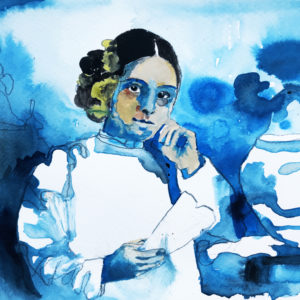
Tye Leung Schulze (1887-1972), the youngest daughter of low-income immigrants from China, was forced into domestic servitude at age nine and escaped an arranged marriage at age twelve. She began her career translating for victims of human trafficking in San Francisco’s Chinatown, working for Donaldina Cameron’s Presbyterian Mission Home. In 1910, Leung Schulze became the first Chinese American woman to work for the federal government as assistant matron and an interpreter at the Angel Island Immigration Station, a detention center designed to control the flow of Asian immigrants into the U.S. under the Chinese Exclusion Act. While there, she fell in love with a white immigration inspector, Charles Schulze, and married him against both their parents’ wishes and California’s anti-miscegenation laws. Both lost their jobs at Angel Island as a result of their marriage. In 1912, the year after California women won the right to vote, Leung Schulze became the first Chinese American woman to vote in a U.S. election. Eventually, she found steady work as one of the operators at the Chinatown Telephone Exchange. After World War II, with the War Brides Act of 1945, the U.S. Immigration Office hired Leung Schulze again as an interpreter for Chinese American servicemen’s wives. Watch episode.
What do you see as the importance of telling histories like this right now?
Sandy: Histories — including oral histories — are living testimonials to the life stories, experiences, challenges, and accomplishments of individuals, communities, our nation, and the world. It is the connective tissue that creates community and identity. Historically, the events that have been recorded and taught as the flagship moments worthy of recognition and recollection are stories of those that have achieved political or military glory, great wealth, fame, or title, led wars, and wrested political power. But this “masculinized” vantage point of history leaves so many stories out — such as the stories of women, as well as men, Black, Latino, Asian, Indigenous, White, straight or cisgender, gay, lesbian, gender non-conforming, rural or non-urban residents, and disabled agents of change on the stage of history.
While 2020 marked the centennial of the passage of the 19th Amendment, it was also a year of disruption and reckoning — confronting racial contradictions and disparities while also reorganizing public perceptions of health and safety. All these factors have contributed to a sense of urgency around the importance of providing our children the tools they need for the future to be leaders that model equality, diversity, and inclusion.
The UNLADYLIKE2020 stories are perfect for the “now,” meeting the moment and opportunity to reverse erasures and misrepresentations, presenting women’s history in an engaging way to excite multi-generational audiences and renew their appreciation of U.S. history and the women who helped make it.
UNLADYLIKE2020 was recently the centerpiece for a virtual education summit called Where Are the Women? Can you describe this event and your goals for educational outreach and engagement?
Sandy: We convened a virtual education conference on YouTube Live on February 13, 2021, the UNLADYLIKE2020 Where Are the Women? Summit, to invite teachers, the general public, and parents who are increasingly active in their children’s education through virtual and hybrid learning, to be part of a conversation about women’s role in history, and to have access to resources to reverse the underrepresentation of women taught in U.S. history and social studies classes K-12. This gathering was inspired by research conducted by the National Women’s History Museum that reported that out of 737 historical figures taught in K-12 curriculum standards in every state, only 178, or 24%, are women, including several fictional characters such as Rosie the Riveter. Ninety-eight of the women who are taught appear in only one state standard; only 15 are named in more than ten states. The summit was designed to provide access to educational support to reverse this trend. The summit was convened to examine why women who contributed to shaping the exercise of democracy in the U.S. are not included in history books or taught in social studies classes.
Teachers received a 2-hour professional development credit for their attendance, and all participants got a free women’s history resource guide as a takeaway. This event attracted over 3,500 unique views, and that number is growing. The video can be watched here.
Finally, in one sentence, what do you hope people will take away from the series?
Charlotte: We hope UNLADYLIKE2020 will inspire, engage, and educate audiences about an underrepresented narrative — how women, and in particular women of color, changed America 100+ years ago, paving the way for future generations to do many ‘unladylike’ things.
You can watch all 26 shorts at www.unladylike2020.com/watch and access lesson plans and curriculum for social studies and U.S. history instruction based on the series at https://www.pbslearningmedia.org/collection/unladylike2020/.
UNLADYLIKE2020 was supported by California Humanities through the California Documentary Project Grant program.

